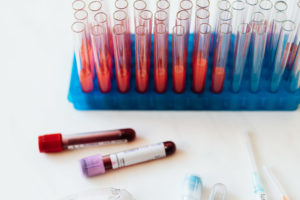Nutrition is a vast and surprisingly unknown field of science: it has been said scientists know more about space than the intricacies of the human body. Millenia of evolutionary history has shaped the physiology of our species and scientists are only scraping the surface of understanding how we function on a cellular level relative to the food we eat. However, focusing on what we DO know about nutrition, at least at the highest reliability and accuracy in science, is a smart first step into assessing health from the inside-out. Blood testing can be a helpful guide to determine an optimal nutrition plan to achieve body composition goals, optimize immune system function or improve overall health status.
The Benefits of Blood Testing
Blood testing is one of the easiest ways to take a glimpse into the inner workings of the body and show how outside factors (i.e. the food we eat) affect function. This usually involves collecting a sample of blood through a finger prick or needle draw, then a certified lab runs a test to analyze the blood sample through specific testing procedures. Results are given back to the patient and interpreted by a professional for further understanding.
Blood tests can provide a wide range of information, including nutritional deficiencies (vitamin and minerals), hormone levels and immune system markers. These factors can indicate where supplementation or a change in nutrition may be needed, otherwise imbalances may lead to health issues over time.
Comparing blood tests before and after a nutrition protocol is followed for a length of time can show what foods are benefitting your body at a cellular level, and give clues on how well the body is (or isn’t) absorbing nutrients. This can direct which nutritional changes are needed to benefit to your health. Testing can also provide valuable information on immune system functioning so you are able to take steps to help keep safe from outside invaders.
Types of Blood Tests
Nutritional: Vitamins & Minerals
It’s relatively simple to track intake of macronutrients (protein, fats, carbohydrates), but a lot more difficult to know which micronutrients (vitamins and minerals) we consume and absorb through our diet. Blood testing can detect levels of critical vitamins needed for healthy physiological functioning, including iron, calcium, potassium, Vitamin C, Vitamin B, folate, and amino acids, to name a few. With this information, a tailored nutrition protocol or supplementation strategy can be implemented into your diet to increase or balance vitamins and minerals where needed.
Hormonal: Glucose-Insulin, Sex Hormones & Thyroid Panels
Blood tests can also reveal blood sugar levels, hormone activity, and markers that indicate proper thyroid functioning. Blood glucose (sugar) is typically regulated by insulin, a hormone released by the pancreas that moves glucose into muscle tissue for energy. In the U.S., a surprisingly large proportion of the population is insulin resistant or prediabetic and may not know until they are diagnosed by a doctor. Insulin resistance or prediabetes can sometimes explain otherwise unexplainable weight gain, low energy and excessive thirst. Getting a blood glucose and insulin level test can help determine if the glucose-insulin pathway is working correctly. Nutritional interventions and in some cases, medication, can help regulate or possibly reverse prediabetes.
An imbalance in sex hormones (estrogen, progesterone, testosterone) may seem subtle, since the effects can be slow to come on and happen over time, as they control aspects of health such as mood, weight loss or gain, and libido. Also, as we age, hormone levels also decrease naturally. Blood tests can reveal levels of these crucial hormones in the body to help explain certain “quiet” symptoms that may lead to larger health issues over time.
Finally, a full thyroid panel can be determined through a blood test, revealing levels of Thyroid-Stimulating Hormone (TSH), T3 Uptake, T4, and Free Thyroxine Index (T7). These critical hormones produced in the pituitary gland help control energy, temperature, heart rate and metabolism. Low thyroid hormone levels can lead to weight gain, lowered body temperature, fatigue, and changes in hair and skin. Alternatively, heightened thyroid levels can bring on unexplained weight loss, nervousness, fatigue, rapid heartbeat and high body temperature. Oftentimes, medication is needed to replace or regulate thyroid hormone production or release, but nutritional strategies can also help with imbalances.
Immune System Markers
Blood tests can also show whether or not the body has been infected by a virus by identifying antibodies in the blood. For instance, when the body is invaded by a virus, the immune system produces antibodies to fight off the sickness. Remaining antibodies are “flagged” for the same virus to provide stronger immunity against the invader, should it enter the body in the future. A simple example of this is a seasonal flu shot: an inactive form of the flu virus is injected into the body so the immune system can “flag” antibodies against the specific strand, which helps the immune system better defend against a future infection form the active form. Most relevant now is the COVID-19 antibody test, which can show the presence of antibodies in the body, indicating that body has likely fought off the virus previously. This is especially important, as we now know an infection can be asymptomatic.
What helps power healthy levels of vitamins, minerals, hormones, and immune system function? Nutrition. In most cases, food is medicine when it comes to regulating these important factors in the body. Eating a balanced diet of whole, fresh foods and eliminating processed, food-like “substances” that can be high in sugar and chemicals is the best way to prevent health issues related to nutritional deficiencies or hormone imbalances. Harnessing science through blood testing can bring either peace of mind that our nutrition and lifestyle is providing healthy levels of these crucial compounds, or if there is a need for a change in nutrition or medical intervention.
Interested in checking your blood levels? Composition ID offers comprehensive blood work panels ordered through a third-party service. Call us to get started!



